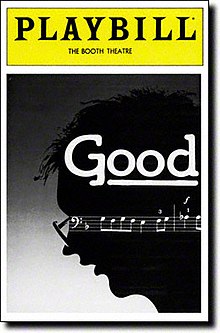Good (play)
| Good | |
|---|---|

Original playbill for the 1982 Broadway production
|
|
| Written by | Cecil Philip Taylor |
| Date premiered | 9 September 1981 |
| Place premiered | Donmar Warehouse London, England |
| Original language | English |
| Subject | The path of Professor John Halder to the embrace of Nazi antisemitism |
| Genre | Drama, Tragedy |
| Setting | Frankfurt, 1932–41 |
Good is an award-winning play in two acts written by British playwright Cecil Philip Taylor. First published for Methuen Drama in 1982, it was originally commissioned by the Royal Shakespeare Company in 1981 and was subsequently seen all over the world.Good has been described as the definitive piece written about the Holocaust in the English-speaking theatre. Set in pre-war Germany, it shows how John Halder, a liberal-minded professor whose best friend is the Jewish Maurice, could not only be seduced into joining the Nazism, but step-by-rationalised-step end up embracing the final solution justifying to his conscience the terrible actions.
John Halder is a Frankfurt literary professor and an example of the good man: he is apparently devoted to his wife and children and he does his best to look after his aged mother. He even tells his best friend, who is a Jewish psychiatrist, that the anti-Semitism of the National Socialists is "just a balloon they throw up in the air to distract the masses." But this is Germany in 1933, and men can change. Cecil P. Taylor, in tracing his hero's progress over eight years towards the upper echelons of the SS, plausibly explains the private flaws that lead to endorsement of public monstrosity. Beneath Halder's surface 'goodness' lies a chilling moral detachment: he can abandon his distracted wife for a devoted student, he has written a pro-euthanasia novel, he hears in his head a continuous musical score that helps blot out daily reality. Taylor's point is that Nazism preyed on individual character flaws and on a missing moral dimension in otherwise educated and intelligent people. At first Halder believes he can help 'push the Nazis towards humanity'. Slowly he succumbs to vanity, careerism and the desire for an easy life. Above all, he remains curiously detached from reality. At the end Halder not only becomes a member of the Nazi party but also plays a direct role in SS book burnings, in euthanasia experiments, in the night of the Broken Glass, and, finally, in Adolf Eichmann's genocide at Auschwitz, where Maurice, the sole source of a Jewish perspective in the play and original force of "good" in Halder, ends up being deported.
...
Wikipedia
